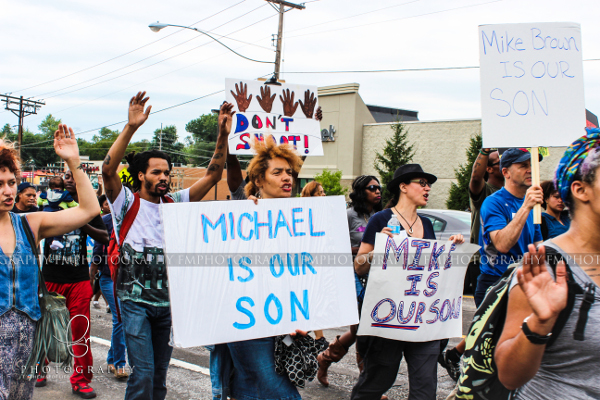
PHOTO/TORRIUAN AND DERRICK, INSTAGRAM: @FMPHOTOGRAPHY13; 314-299-8740/314-695-6923
The murder of Black, unarmed Michael Brown by white Police Officer Darren Wilson in Ferguson, Missouri, created a massive national and international response. The police would not allow the parents to claim or cover the body and Michael Brown’s corpse lay unattended in the street for over three and a half hours. When demonstrators gathered to protest the killing, they were met by armored military personnel carriers, camouflaged, masked police carrying automatic rifles, rubber bullets, snarling K-9 dogs, clubs and clouds of tear gas. The scene was more reminiscent of the Sharpsville massacre in apartheid South Africa than in “post-racial America.” The worst of something old and a frightful vision of something new emerged in Ferguson.
Pundits of all political outlooks rushed to examine the murder and the response. Kareem Abdul-Jabbar’s editorial, published in Time.com describes the unrest in Ferguson as not just about racism, but also about class warfare. Others declared this was simply resurgent fascist racism.
What are we dealing with—race or class? The answer is both. The real world does not exist in logical boxes, but in fluid, struggling, constantly transforming opposites that move a process forward. Racism is an ideology justifying the super exploitation of the Black worker. Racism must be fought to create the conditions for class unity.
The basis of the historic race versus class discussion was created when slavery became almost totally Black and the free workers almost totally white.
The fact that both sectors were workers was forgotten. Karl Marx reminded the white workers who were struggling against their semi-slave-like exploitation that “Labor cannot emancipate itself in a white skin, where in the Black it is branded.”
After the Civil War, the counter-revolution against emancipation institutionalized the color division in the working class. In the main, the Black worker was consigned to service and agricultural labor and the white worker to industry.
The Roosevelt era labor reforms guaranteed the right to industrial union organization. There was understanding that there would not be southern trade union organization. This meant that most of the Black workers would be excluded from unions.Social security and minimum wage did not cover service and agriculture, explicitly excluding most of the Blacks, bribing the white worker and hardening the color division in the class. The hard fought battles for labor unity could not be won so long as such economic and political inequality existed.
Unity can only be achieved when white and Black workers are equal. Electronics applied to production, and the ending of human labor, has finally created the elementary conditions for such unity.
Ferguson expresses that without a fight against racism the workers cannot rise out of poverty. Without a fight against poverty they cannot destroy racism. As one demonstrator said during the Freedom struggles, “Why fight for the right to buy a cup of coffee in that restaurant if I don’t have the quarter?”

